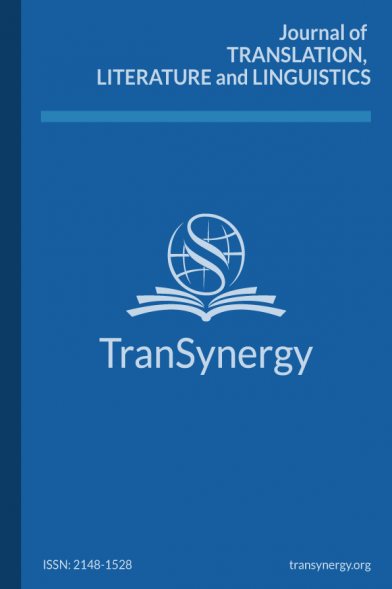Analysis of Türkiye’s National Translation Capacity
national translation capacity, Türkiye, translation management, translation services, translation dissemination
Analysis of Türkiye’s National Translation Capacity
national translation capacity, Türkiye, translation management, translation services, translation dissemination,
___
Akçayoğlu, D. İ., & Özer, Ö. F. (2020). The occupational status of translators and Interpreters in Turkey: Perceptions of professionals and translation students. Çeviribilim Ve Uygulamaları Dergisi, 29, 61–82. https://doi.org/10.37599/ceviri.805117
Aksoy, B. (2005). Translation activities in the Ottoman Empire. Meta: Translators’ Journal, 50(3), 949–956. https://doi.org/10.7202/011606ar
Albiz, Ü. (2018). Çeviride İdeoloji: 1960-1980’li Yıllarda Türkiye’de Yayıncılık ve Çeviri, Çeviri Eserler ve Dergicilik Faaliyetleri, [Doctoral dissertation]. Sakarya University.
Ayık Akça, T. (2022). Edebi metinlerde ve uzmanlık alan metinlerinde makine çevirisinin olanakları/olanaksızlığı: çevirmenin değişen görev tanımlarına yeniden bakmak. RumeliDE Dil ve Edebiyat Araştırmaları Dergisi, 30, 1321-1343. DOI: 10.29000/rumelide.1188804
Brecht, R. D., & Walton, A. R. (1993). National Strategic Planning in the Less Commonly Taught Languages, NLFLC Occasional Paper, https://files eric.ed.gov/fulltext/ED367184.pdf
Cooper, R. L. (1989). Language planning and social change. Cambridge University Press.
Coşkun, Ö., & Tunalı, G. (2020). Low Socıal Status, High Individual Status: Turkish Translators in the State and Private Sectors. Dokuz Eylül Üniversitesi Sosyal Bilimler Enstitüsü Dergisi, 22(4), 1427-1446. https://doi.org/10.16953/deusosbil.803256
Çalışkan, D., & Kartal, E. (2021). Türkiye’deki çeviri konulu tezler üzerine Bibliyometrik bir i̇nceleme (1985-2020). İstanbul Üniversitesi Çeviribilim Dergisi, 15, 1–39. https://doi.org/10.26650/iujts.2021.987390
Ersoy, H. (2014). Türkiye’de serbest çevirmenlerin karşılaştıkları sorunlar, bu sorunların etkileri ve öneriler. Turkish Studies, 9(6), 367. https://doi.org/10.7827/turkishstudies.6980
Eruz, S. (2012). Çeviri Derneği ve Türkiye’de çevirmenlik mesleğinin statüye kavuş(a)ma(ma)sı üzerine on üç yıllık gel gitli bir öykü [The Translation and Interpreting Association of Turkey and the 13-year story of the status of the translation profession in turkey]. Proceedings of the Ministry for EU Affairs Translation Platform (pp.17–23), organized by the Ministry for EU Affairs. İstanbul. June 9, 2012.
Fırat, G. (2021). Uberization of translation. The Journal of Internationalisation and Localisation, 8(1), 48–75. https://doi.org/10.1075/jial.20006.fir
Güngör- Kılıç, E. (2023). Relationship of series production and export dynamics and cultural interaction in Türkiye, In İ. Sarıtaş & A. Özsoy (Eds.), Turkish Series in the Process of Cultural Change and Industrialization 2010 – 2020.
Gürçağlar, Ş. T. (2008). The Politics and Poetics of Translation in Turkey, 1923-1960. https://doi.org/10.1163/9789401205306
Intel’den Türk yazılımına önemli yatırım. (2008, April 4) https://www.chip.com.tr/haber/intel-den-turk-yazilimina-onemli-yatirim_6291.html
Köktürk, Ş. (2015). Uygulamalı Çeviribilim. Ankara: Detay Yayıncılık.
Kurt, M, (2012). Çeviri ve Çevirmenlik Mesleğinin Hukuk Muhakemeleri Kanunu ve Ceza Muhakemesi Kanunundaki Yeri, Avrupa Birliği Bakanlığı Çeviri Platformu, Avrupa’nın Dili Çeviridir, İstanbul.
Öner, I.B. (2012). Sektörde ve Akademide Kronometre Çalışmaya Başladı. Yarışı Göğüslemek İçin Ne Yapmalıyız?. Proceedings of the Ministry for EU Affairs Translation Platform, (pp.4-9), organized by the Ministry for EU Affairs. İstanbul. June 9, 2012.
Rakamlarla TEDA. (n.d.). https://teda.ktb.gov.tr/TR-250769/rakamlarla-teda.html
Ren, W., & Li, J. (2023). Defining national translation capacity: a comprehensive framework for analyzing translation at country level. Perspectives: Studies in Translation Theory and Practice, 31(6), 1092–1109. https://doi.org/10.1080/0907676x.2023.2194547
Seçkin, S. (2021). Serbest çevirmenlerin Türkiye çeviri sektöründe yaşadığı zorluklar. RumeliDE Dil ve Edebiyat Araştırmaları Dergisi, (23), 1128-1147. DOI: 10.29000/rumelide.950037.
Suçin, M. H. (2021). Başka dillerde Türk edebiyatı. Ecinniler İki Aylık Kültür Edebiyat Dergisi, 30-40.
TürkYayBir. (2023). 2022 Yılı Türkiye Kitap Pazarı Raporu. https://turkyaybir.org.tr/2022-yili-turkiye-kitap-pazari-raporu/
Uysal, N. M., Odacıoğlu, M.C., Köktürk, Ş. (2015). Meslekleşme açısından Türkiye’de çevirmenliğin mevcut durumu, sorunlar ve çözüm önerileri. Uluslararası Sosyal Araştırmalar Dergisi, 8(36). https://doi.org/10.17719/jisr.2015369505
Uysal, N.M. (2017). Çevirmenlikte meslekleşme ve çevirmen sertifikasyonu. Ankara: Gece Kitaplığı.
Yaşar, C. Y. (2023). Makine çevirisindeki gelişmelerin Türkiye’deki lisansüstü çeviri programlarına yansıması üzerine bir i̇nceleme. Turkish Studies- Language and Literature, 18(3), 2101–2119. https://doi.org/10.7827/turkishstudies.71106
Yılmaz-Gümüş, V. (2018). Solidity and professionalization of translation: Turkey as a case in point. HERMES - Journal of Language and Communication in Business, 58, 43–63. https://doi.org/10.7146/hjlcb.v0i58.111661
YÖK Atlas. (2023). https://yokatlas.yok.gov.tr/lisans-anasayfa.php
- ISSN: 2979-9503
- Yayın Aralığı: Yılda 2 Sayı
- Başlangıç: 19.12.2022
The Seventh Function of Language A Novel: The Linguistic Turn in Fiction
Translating Secondary World Infrastructures: Re-creating the World-Building of Semley’s Necklace
Analysis of Türkiye’s National Translation Capacity
The Sound of Silence: Through “Things Fall Apart” by Achebe and “Wide Sargasso Sea” by Rhys
